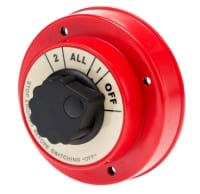 By Bob Currie, Recreational Boating Safety Specialist
By Bob Currie, Recreational Boating Safety Specialist
U. S. Coast Guard Auxiliary Station Galveston Flotilla
Boat maintenance, especially in salty climes such as the Texas Gulf Coast, is a very important part of being a boat owner. If your car breaks down, you just call for someone to pick you up. But when you are many miles offshore, not many people can drop what they are doing and come pick you up; therefore, it is in your best interest to keep your boat in tip top shape by performing scheduled and necessary maintenance and repairs. When performing maintenance, we often think in terms of systems such as the fuel system, the steering system, and the electrical system. This column will discuss some aspects of electrical system maintenance, including the battery.
The Base Galveston Flotilla of the US Coast Guard Auxiliary operates out of the US Coast Guard base on Galveston Island. They aid the Coast Guard by providing maritime observation patrols in Galveston Bay; by providing recreational boating vessel safety checks; and by working alongside Coast Guard members in maritime accident investigation, small boat training, providing a safety zone, Aids to Navigation verification, cooking in base and station galleys and aboard cutters; and on the Coast Guard Drone Team.
Chemistry 101: A Salt
Let’s be clear about one thing: Chemistry 101 is not a real course. In college course-numbering systems, the first number is for the year of the course (1 means it is a first year course), the second number is for the number of credits you get for completing the course (0 means you aren’t getting any college credit for reading this), and the third number is for the sequence of the course (1 means it is the first course). Now back to the lesson.
Sodium chloride is the most abundant salt found in sea water, although there are other salts in the sea besides sodium chloride. In its molecular form sodium chloride consists of one atom of sodium and one atom of chlorine. Sodium is a chemical element of the alkali metal group. It is a very soft silvery-white metal. It is not found in nature in pure form because it is a very reactive atom. When pure sodium metal is exposed to air or water, it explodes violently. Chlorine is a yellow-green poisonous gas in its pure molecular form. If sodium is an explosive metal and chlorine is a poisonous gas, how on earth can we be exposed to seawater and not die? Well, when sodium combines chemically with chlorine to form sodium chloride, it forms a compound with properties of its own that have nothing to do with the properties of the individual molecules. What about when sodium chloride dissolves in water? When sodium chloride dissolves in water, pure sodium and pure chlorine are not formed. Instead, the sodium molecule ionizes into single atoms of sodium (with a positive charge) and chlorine (with a negative charge). We call those free charged atoms ions. An ion is an atom or molecule that carries an electric charge. Sodium ions carry a positive charge (written as Na+) while chlorine ions carry a negative charge (written Cl-). It is those charged particles that help cause all the metal damage on boats.
Corrosion
Corrosion is a natural process that converts a refined metal into a more chemically stable form such as an oxide. The problem with those oxides (rust is called iron oxide) is that they destroy the metal, and the desirable properties of the metals such as strength and electrical transmission are lost. Saltwater corrodes metal five times faster than fresh water does, and the salty, humid Gulf of Mexico air causes metal to corrode 10 times faster than air with normal humidity. Boat maintenance to stop or at least reduce the corrosion due to saltwater consists of routinely rinsing the boat with fresh water after use, keeping electrical connections dry and clean, and protecting such connections with a good seal from moisture. If you notice any corroded connections, you should clean or replace the connections as needed. There are some good electrical anti-corrosive sprays on the market that can be used on electrical connections, including on your battery terminals.
Battery
I was in line for the ferry early one morning to go to work on base. The deck hands unloaded the incoming ferry, and I put my truck in gear in anticipation of moving forward to load the ferry. But we were not directed to load. After a few long minutes we could see why: the deck hands were using the car pusher to shove a car off the ferry due to it having a dead battery. I asked the deck hands how often this happens. They said several times a day. People just don’t take care of their batteries like they used to. We don’t have full service gas stations like we used to. Well folks, I hate to tell you this, but there are no boat pushers out there on the water, so you better make sure you take care of your boat batteries unless you want to pay for an expensive water tow.
Battery Care
Get the most from your boat’s batteries by following these guidelines:
- Keep your batteries fully charged. Leaving a battery even partially discharged leads to sulfation and loss of capacity.
- Check the electrolyte solution level regularly. Top up as necessary with distilled water to keep the level about ¼” above the plates.
- Use only distilled water for topping up. Trace minerals and chlorine from tap water really do shorten battery life.
- Fill cells only after charging. If you fill them before, expansion during charging will pump electrolyte out on top of the battery, causing a corrosive mess and reducing the acid concentration inside the battery.
- Keep the top of the case clean and dry. Most boat batteries have a cover for just that purpose. Dampness, dirt and acid on top of the battery case can create a circuit between the terminals that will drain the battery or lead to stray voltage that can destroy your electronics.
- Keep terminals and cable clamps corrosion-free. There are commercial products such as dielectric grease you can use to coat the terminals to help prevent new corrosion.
- Make sure the positive terminal of the battery is covered.
- Secure the battery correctly. An unsecured battery will not pass a Coast Guard Vessel Safety Check. The battery must withstand a 75-pound pressure from the side without tipping over under Coast Guard regulations.
- If the battery is discharged to such an extent that it cannot crank the engine, and hence the engine has to be started by other means, then the alternator can’t recharge the battery. When this condition arises the battery must be removed and bench-charged, because the voltage required to restore it is higher, and that higher voltage cannot be provided by the charging system of the boat.
Boat Battery Cut-Off Switch
We have already said that even partially discharging a battery reduces its life. In salty air like we have on the coast, it is easy for low voltage stray circuits to be established. These stray circuits not only discharge your battery over time, they play havoc with your electronic instruments.  Many new boats come with a battery cut-off switch that disconnects the battery from all possible routes of stray currents. This switch is also a fire safety item. If you have an electrical fire on your boat due to a short, you can cut off the source of electricity by placing your battery cut-off switch in the Off position.
Many new boats come with a battery cut-off switch that disconnects the battery from all possible routes of stray currents. This switch is also a fire safety item. If you have an electrical fire on your boat due to a short, you can cut off the source of electricity by placing your battery cut-off switch in the Off position.
Summary
Care of your boat’s batteries is essential to getting back home safely from a trip on the water. Follow your battery manufacturer’s instructions for preventive maintenance and care and you will get back in on your own power.
For more information on boating safety, please visit the Official Website of the U.S. Coast Guard’s Boating Safety Division at www.uscgboating.org. Questions about the US Coast Guard Auxiliary or our free Vessel Safety Check program may be directed to me at [email protected]. I am available to perform free Vessel Safety Checks, and I will come to your location to perform them. SAFE BOATING!
[Jan-25-2021]

 Posted in
Posted in 























